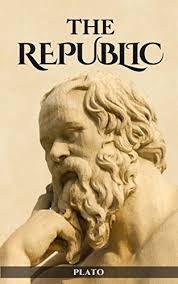Republic Page #2
The Republic is a Socratic dialogue, written by Plato around 380 BC, concerning justice, the order and character of the just, city-state, and the just man.
Genre: Fiction
Genre: Fiction
- Year:
- 381
- 1,114 Views
The argument of the Republic is the search after Justice, the nature of which is first hinted at by Cephalus, the just and blameless old man--then discussed on the basis of proverbial morality by Socrates and Polemarchus--then caricatured by Thrasymachus and partially explained by Socrates--reduced to an abstraction by Glaucon and Adeimantus, and having become invisible in the individual reappears at length in the ideal State which is constructed by Socrates. The first care of the rulers is to be education, of which an outline is drawn after the old Hellenic model, providing only for an improved religion and morality, and more simplicity in music and gymnastic, a manlier strain of poetry, and greater harmony of the individual and the State. We are thus led on to the conception of a higher State, in which 'no man calls anything his own,' and in which there is neither 'marrying nor giving in marriage,' and 'kings are philosophers' and 'philosophers are kings;' and there is another and higher education, intellectual as well as moral and religious, of science as well as of art, and not of youth only but of the whole of life. Such a State is hardly to be realized in this world and quickly degenerates. To the perfect ideal succeeds the government of the soldier and the lover of honour, this again declining into democracy, and democracy into tyranny, in an imaginary but regular order having not much resemblance to the actual facts. When 'the wheel has come full circle' we do not begin again with a new period of human life; but we have passed from the best to the worst, and there we end. The subject is then changed and the old quarrel of poetry and philosophy which had been more lightly treated in the earlier books of the Republic is now resumed and fought out to a conclusion. Poetry is discovered to be an imitation thrice removed from the truth, and Homer, as well as the dramatic poets, having been condemned as an imitator, is sent into banishment along with them. And the idea of the State is supplemented by the revelation of a future life. The division into books, like all similar divisions (Cp. Sir G.C. Lewis in the Classical Museum, vol. ii. p 1.), is probably later than the age of Plato. The natural divisions are five in number;--(1) Book I and the first half of Book II down to the paragraph beginning, 'I had always admired the genius of Glaucon and Adeimantus,' which is introductory; the first book containing a refutation of the popular and sophistical notions of justice, and concluding, like some of the earlier Dialogues, without arriving at any definite result. To this is appended a restatement of the nature of justice according to common opinion, and an answer is demanded to the question--What is justice, stripped of appearances? The second division (2) includes the remainder of the second and the whole of the third and fourth books, which are mainly occupied with the construction of the first State and the first education. The third division (3) consists of the fifth, sixth, and seventh books, in which philosophy rather than justice is the subject of enquiry, and the second State is constructed on principles of communism and ruled by philosophers, and the contemplation of the idea of good takes the place of the social and political virtues. In the eighth and ninth books (4) the perversions of States and of the individuals who correspond to them are reviewed in succession; and the nature of pleasure and the principle of tyranny are further analysed in the individual man. The tenth book (5) is the conclusion of the whole, in which the relations of philosophy to poetry are finally determined, and the happiness of the citizens in this life, which has now been assured, is crowned by the vision of another.
Translation
Translate and read this book in other languages:
Select another language:
- - Select -
- 简体中文 (Chinese - Simplified)
- 繁體中文 (Chinese - Traditional)
- Español (Spanish)
- Esperanto (Esperanto)
- 日本語 (Japanese)
- Português (Portuguese)
- Deutsch (German)
- العربية (Arabic)
- Français (French)
- Русский (Russian)
- ಕನ್ನಡ (Kannada)
- 한국어 (Korean)
- עברית (Hebrew)
- Gaeilge (Irish)
- Українська (Ukrainian)
- اردو (Urdu)
- Magyar (Hungarian)
- मानक हिन्दी (Hindi)
- Indonesia (Indonesian)
- Italiano (Italian)
- தமிழ் (Tamil)
- Türkçe (Turkish)
- తెలుగు (Telugu)
- ภาษาไทย (Thai)
- Tiếng Việt (Vietnamese)
- Čeština (Czech)
- Polski (Polish)
- Bahasa Indonesia (Indonesian)
- Românește (Romanian)
- Nederlands (Dutch)
- Ελληνικά (Greek)
- Latinum (Latin)
- Svenska (Swedish)
- Dansk (Danish)
- Suomi (Finnish)
- فارسی (Persian)
- ייִדיש (Yiddish)
- հայերեն (Armenian)
- Norsk (Norwegian)
- English (English)
Citation
Use the citation below to add this book to your bibliography:
Style:MLAChicagoAPA
"Republic Books." Literature.com. STANDS4 LLC, 2024. Web. 25 Apr. 2024. <https://www.literature.com/book/republic_26>.




Discuss this Republic book with the community:
Report Comment
We're doing our best to make sure our content is useful, accurate and safe.
If by any chance you spot an inappropriate comment while navigating through our website please use this form to let us know, and we'll take care of it shortly.
Attachment
You need to be logged in to favorite.
Log In